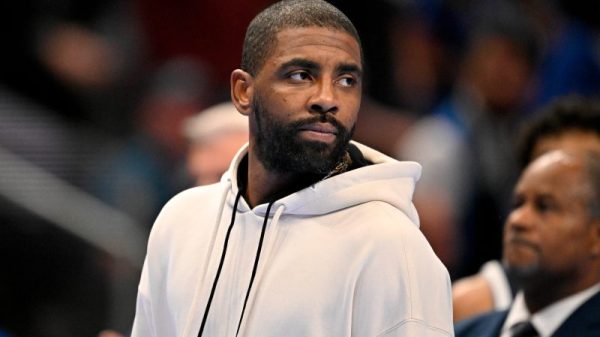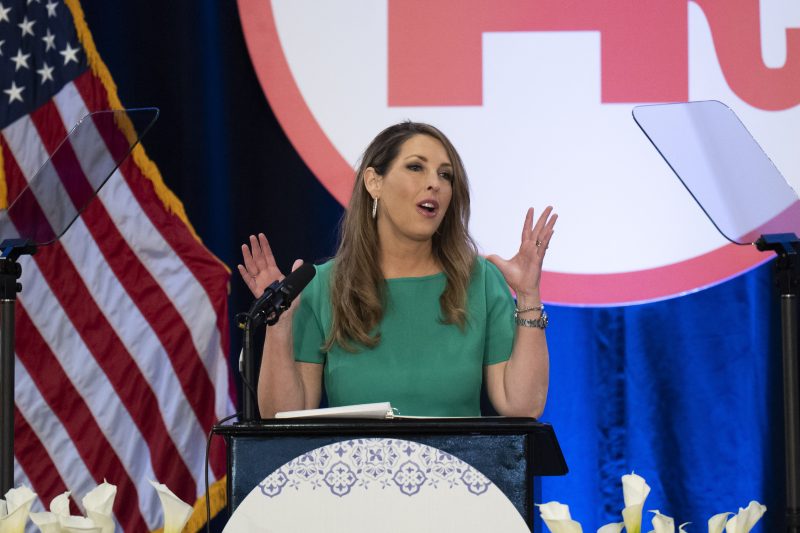Republican National Committee Chairwoman Ronna McDaniel is so concerned that party disunity will sink GOP hopes in the 2024 presidential election that she plans to require all candidates on the official primary debate stages to first pledge their support to the party’s eventual nominee.
But many of the likely contenders are pushing back.
Former president Donald Trump said this month that he won’t commit to supporting the winner if he loses the nomination. “It would have to depend on who the nominee was,” he told a conservative radio host. Former Maryland governor Larry Hogan, another potential candidate, recently tweeted that he “won’t commit to supporting” Trump.
Others have settled on more nuanced hedges. New Hampshire Gov. Chris Sununu, who just created a new organization to help him explore a possible campaign, says he will support the eventual nominee, but is certain Trump won’t be that person. Former Arkansas governor Asa Hutchinson, who has not decided on whether to sign a pledge, has gone so far as to speak with McDaniel about his opposition to it, arguing that Republicans should not be enforcing litmus tests.
“Historically, our party has not taken party loyalty oaths,” said Hutchinson, who returned to Iowa this week as he explores a possible campaign launch in early April. “For leaders such as myself who believe Donald Trump is not the right direction for the country — and I said specifically that Jan. 6 disqualified him — that would certainly make it a problem for me to give an across-the-board inclusion pledge.”
The pushback has underscored McDaniel’s concern but has not shifted her plans, according to multiple people involved in the process who spoke on the condition of anonymity to discuss the planning. The Republican National Committee’s Temporary Standing Committee on Presidential Debates plans to meet next Wednesday and Thursday to formally set the rules for officially sanctioned debates this year. They intend to require candidates to sign a pledge to support the eventual nominee modeled on a similar document circulated by the RNC in 2015.
The meeting is also expected to lead to the adoption of debate management techniques that Democrats embraced in the 2020 campaign, the people said. Republicans will require candidates to prove they have a certain number of grass-roots donors and meet a threshold of polling support to get on the stage.
Party leaders have also discussed, but not decided on, randomly placing candidates on the debate stage, instead of ranking them by public polling as Republicans did in the 2016 cycle. If more candidates qualify for the debates than can fit on one stage, the party could also ask media organizations to host two consecutive nights of debate, as Democrats did in 2019, with randomly sorted groups of candidates. In 2016, Republicans relegated lower-polling candidates to an earlier debate on the same night.
David Bossie, a longtime Trump adviser who is not currently working for Trump, is managing the debate process for the RNC. In recent weeks, party officials have met with news executives in New York and Washington about their bids to stage debates, people familiar with the matter said. The committee is inclined to start the debates in July or August, with a schedule to follow of roughly monthly contests that echoes the 2016 plan. The Washington Post is among those seeking a potential role in one of the debates, Republicans involved in the process say.
“We do need to come out of this primary united. And we have a lot of candidates running saying, ‘I’ll never support Trump,’ and if you are going to get on this debate stage, you are going to have to say, ‘I’m going to support the nominee,’” McDaniel said on Jan. 20, during an interview on the “War Room” podcast. “We cannot have a rigorous debate process and come out with a nominee and have anyone say, ‘I’m walking away.’”
McDaniel also described her concerns at a private breakfast of Republican committee members days later in California, where she noted that she is the niece of Sen. Mitt Romney (R-Utah) — a steadfast Trump critic — and was first appointed to lead the RNC by Trump. She said she was aware that there are leaders in the party who are unlikely to support each other, according to two people present at the event. She called on the party to focus less on whether individuals are Republican enough and more on how the party can beat Democrats.
McDaniel has pledged to run a neutral primary process. She has told others she was best positioned to prevent Trump and other candidates from mounting a third-party bid if he fails to win the Republican nomination next year — and she has kept in close touch with Trump since he left office.
“The RNC will remain neutral during the Republican presidential primary and that’s why it is so important for the RNC to ensure a fair and transparent process for the 2024 Republican candidates to debate,” McDaniel said in a statement to The Post. “After the primary, it is imperative to the health and growth of our Republican Party, as well as the country, that we all come together and unite behind our nominee to defeat Joe Biden and the Democrats.”
Trump did not take a public position on McDaniel’s recent effort to continue as party chair. Privately, he offered to endorse her in the RNC race, people familiar with the matter said, but she said she did not need it.
Though the campaign for president is only just beginning, public polling has offered some alarming warning signs for Republicans. A recent Monmouth University poll found 27 percent of Republican voters said Trump “should run as an independent” if he does not win the GOP nomination. The same poll found 33 percent of Republicans volunteered Trump’s name as the candidate they support for the Republican nomination, while an equal share named Florida Gov. Ron DeSantis. No other candidate got more than 2 percent support.
Concern over Trump running as a third-party candidate drove a similar effort in 2015 by then-RNC Chairman Reince Priebus to get a pledge of support for the nominee from all of the major candidates in the race, though the pledge was not explicitly tied to debate participation. Trump said at the party’s first debate in that cycle that he would not pledge to forgo an independent bid if he lost the nomination. Weeks later, he signed the Priebus pledge promising to endorse the party’s nominee, “whoever it is.”
“I see no circumstance under which I would tear up that pledge,” he said at the September 2015 event in Manhattan. Six months later, at a CNN town hall event in Milwaukee, Trump backed away from that commitment. “No, I don’t anymore … We will see who it is,” he said, when asked if he would stick with his pledge to support the eventual Republican nominee.
At the same event, Ohio Gov. John Kasich, who had previously said he would support the GOP nominee, also backed away from his previous commitment. He did not vote for Trump in the general election that year, choosing to write in the name of Sen. John McCain (R-Ariz.) instead, according to a spokesman.
Under party rules, there is little the RNC can do, beyond disinviting candidates from its own events, to punish candidates if they decide to appear at unsanctioned debates.
“It is advantageous for the campaigns to work together to try to control the number of debates,” said David Carney, a Republican strategist in New Hampshire. “It is a collaborative effort, because it is mutually beneficial. But there is no enforcement mechanism to enforce it.”
Democrats in the 2020 cycle, facing similar concerns of a third-party bid, required all candidates who were invited onto their primary debate stages to first sign a “Written Affirmation” that they would run as a Democrat and “serve as a Democrat if elected.” An independent liberal group, Indivisible, circulated a separate pledge among Democratic candidates, asking them to commit to supporting the party’s nominee.
Recent history is littered with examples of third-party candidates appearing to have a material impact on the outcome of a presidential race. The independent campaigns of Green Party candidate Ralph Nader and Reform Party candidate Pat Buchanan played a role in Republican George W. Bush’s crucial victory in Florida in the 2000 presidential race. Businessman H. Ross Perot’s Reform Party in 1992 and 1996 helped Democrat Bill Clinton win the White House twice with less than 50 percent of votes cast.
Whit Ayres, a Republican pollster, said the nightmare scenario for Republicans in 2024 could resemble the 1912 election, when former Republican president Teddy Roosevelt challenged the incumbent Republican president Howard Taft as a candidate on the Progressive Party ticket. The two men split Republican voters, allowing Democrat Woodrow Wilson to win the presidency.
“The obvious risk is splitting the Republican vote and putting the Democratic candidate in office,” Ayres said. “We have precedent for that.”
Advisers close to Trump said he has not made a final decision on participating in the debates. While some close to him say he could not forgo the attention that the debates bring, others say he wants to look like the inevitable nominee and participating could diminish that perception.
“President Trump is the undisputed leader of the Republican Party and will be the nominee,” Trump campaign spokesman Steven Cheung said.
But others say there is a still a long way to go before such a nightmare scenario emerges for the party. Sununu says he is confident that over the next year of campaigning Republicans will conclude both that it is time to move on from Trump and that any third-party bid would be self-defeating.
“What we do now is don’t panic,” Sununu said in an interview. “Are people saying, ‘I would never support anyone except Trump?’ Absolutely. And I have no doubt if and when he doesn’t win, it’ll be a bit of a circus, or could be, in that you don’t know. Is he going to leave the race quietly? Is he going to support another candidate?”
Sununu added that in that scenario he thinks voters would ultimately reject an effort to split the party. “That would only hurt conservatives and Republican values,” Sununu said. “That would only be handing a win to the Democrats.”



























